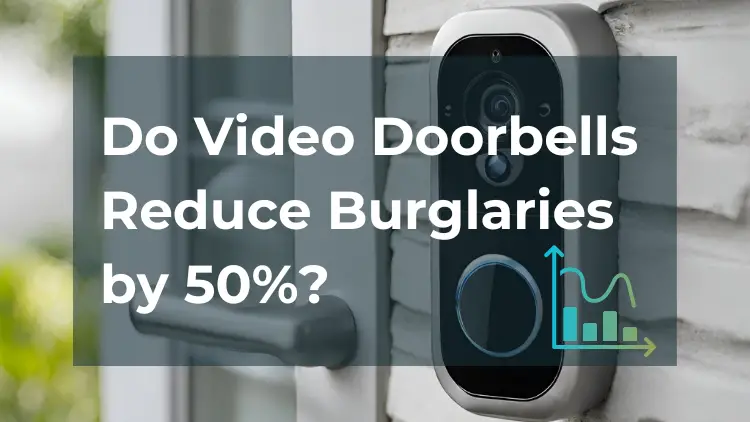The short answer is that video doorbells do not conclusively reduce the chance of burglary. While some reports indicate they may deter opportunistic thieves, their overall effectiveness remains debated among researchers. More robust home security measures like alarms and locks are likely better burglary deterrents.
Video doorbells, sometimes called smart doorbells, have surged in popularity in recent years. Global sales reached 11.7 million units in 2021, a 63% increase from 2020 and the global spending on smart home video doorbell products reaches 1.4 billion U.S. dollars in 2023.

These internet-connected devices feature cameras that provide live video feeds, motion alerts, two-way audio communication, and video recording capabilities. Leading brands like Ring and Nest allow homeowners to monitor their front doorsteps remotely via smartphone apps.
When motion is detected, doorbell cameras can instantly notify users and share video clips. Manufacturers like Amazon-owned Ring market this real-time home monitoring as an effective burglary deterrent.
But does the research data actually support video doorbells reducing burglary rates?
Limited Evidence of Burglary Reduction
Video doorbell providers cite studies pointing to crime reduction in neighborhoods using their products. For example, Ring claimed its doorbell cameras reduced burglaries in Newark, NJ by 50%. However, the methodology of this study has faced scrutiny from researchers (1, 2).
Critics point to a lack of peer-reviewed evidence substantiating video doorbells significantly lowering burglary or other property crime rates. Most crime data Ring cites comes directly from surveys of its own users.
Based on the datasets used by MIT Media Lab researchers to generate the first nationwide map of Ring users and usage patterns, there is limited evidence suggesting that Ring cameras have little to no effect on crime in Los Angeles, despite the city having a significant number of these devices (3, 4).
Nothing shows better that there is no consensus on the issue than the fact that a study by the University of North Carolina’s Department of Criminal Justice and Criminology claims that 60% of burglars will choose another target if they find cameras (5).
Ring has disputed the studies questioning its claims of crime reduction, arguing they lack sufficient statistical power. However, independent researchers counter that the onus is on Ring to provide more transparent user data to validate its burglary reduction assertions.
Preventing Opportunistic Crime
While video doorbells may not demonstrably reduce overall community burglary rates, some research indicates they may discourage opportunistic theft (see the North Carolina study above).
The sight of a video doorbell could deter a would-be burglar scoping out homes to target.
Footage also allows residents to monitor suspicious activity at their home while they’re out. This remote monitoring capability may prevent opportunistic crimes by increasing the chance of getting caught.
However, little empirical research exists on how video doorbells may specifically deter opportunistic theft. More study is needed on their capability to prevent criminals from spontaneously targeting homes based on perceived vulnerability.
Video Doorbells Are Not a Replacement for Physical Security
Experts emphasize video doorbells should not replace robust physical security measures as effective burglary prevention.
Upgrading locks, installing alarm systems, and reinforcing entry points can harden homes against forced entry.
Video footage itself does nothing to physically stop a determined burglar. Doorbell cameras also have technical vulnerabilities hackers could potentially exploit to disable them.
Integrating video doorbells with other home security systems can provide multiple layers of protection. Motion alerts can trigger floodlights, sirens, or automated police calls to supplement the cameras. However, video doorbells alone are inadequate substitutes for robust physical measures.
Privacy vs. Security Concerns
Privacy advocates raise concerns about the expansion of residential surveillance through video doorbell networks operated by private companies. Doorbell cameras capture footage beyond just the doorstep, including public spaces.
Ring and other brands have also faced scrutiny for sharing customers’ video footage with police without consent. However, providers counter that privacy must be balanced with public safety needs (6).
Smart doorbells, aside from potential privacy concerns, may also lack essential cybersecurity measures. In 2019, cybersecurity researchers identified a vulnerability in Ring devices that could have exposed users’ WiFi credentials. This flaw, discovered by Bitdefender, was related to the unencrypted transmission of WiFi login information during the setup process between a Ring doorbell and the user’s network (7).
Although Ring addressed the issue after being privately notified, this incident is not unique, as a similar security flaw was identified in Ring devices back in 2016, highlighting ongoing challenges in ensuring robust cybersecurity for smart doorbells.
Doorbell Cameras and Public Spaces
Another key privacy issue stems from video doorbells potentially capturing public spaces beyond just homeowners’ front steps. Civil liberties groups like the ACLU argue this effectively expands residential surveillance power into community areas (8).
Laws have not kept pace with video doorbell proliferation and the implications for society. Few regulations govern how footage capturing public areas can be shared and used.
Some localities have proposed measures requiring residents to post signage alerting visitors about cameras. But most doorbell camera use occurs in a legal gray area with unsettled expectations of privacy.
Targeting Affluent Homes?
Some experts suggest video doorbells could perversely make certain homes more enticing targets by signaling affluence.
The Centre for Research and Evidence on Security Threats (CREST) recently released a report challenging the perceived effectiveness of smart doorbells, such as the Amazon Ring, in reducing residential burglary rates.
According to CREST, these devices are deemed “unlikely” to have a substantial impact on burglary rates and could potentially increase the risk of break-ins. The argument is that the presence of smart doorbells and locks may inadvertently assist criminals in identifying properties with valuable items, making them potential targets for theft (9).
Smart doorbells could become a strong cue to the relative affluence of properties.
Nonetheless, the possibility doorbell cameras could pique rather than deter criminal interest merits additional study given their expanding residential footprint.
Looking Beyond the Doorbell
Both critics and advocates generally agree more independent research is needed to understand video doorbells’ impacts on burglary rates and crime prevention.
Doorbell camera providers face inherent conflicts of interest in evaluating their products’ effectiveness themselves. And macro-level crime data is prone to confounding variables that complicate determining causation.
Law enforcement applications also raise unresolved oversight issues regarding digital evidence chains of custody and video authenticity. More accountability mechanisms are needed governing private sector collaborations.
Consumer education on both capabilities and limitations is likewise an important priority as video doorbell usage grows exponentially. Avoiding over-reliance on cameras while integrating them with robust physical security provides optimal protection.
Overall, video doorbells offer a degree of situational awareness that could deter some opportunistic crimes. But claims that they significantly reduce burglary rates are not conclusively supported by research evidence. Prudent homeowners should view smart doorbells as just one layer in a robust, multifaceted home security strategy.











